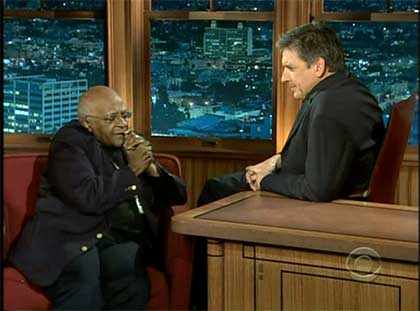
Archbishop Desmond Tutu showed up for an improbable, unprecedented visit to CBS's
The Late Late Show with Craig FergusonWednesday. It's the show the Ferguson folks should submit for Emmy consideration this year -- and it's also the show that should end all sensible speculation regarding the late-night TV wars.
I have seen the future of late-night TV, and his name is Craig Ferguson..
I've been enthusiastic about this Scottish import since he first appeared on The Late Late Show -- even before he got the job, when he was one of many guest hosts given on-air tryouts. But what he's done since taking over -- shaping his show, finding his voice, and every so often shifting gears from the silly to the serious -- couldn't really have been predicted by anyone. Probably not even Ferguson himself.
With his quick wit and friendly manner, Ferguson has a gift for putting guests at ease: He's a world-class flirt, but charms men as easily as women. He has note cards on his desk for each interview, but makes a big show of ripping them up at the start, signalling to the audience, and to the guest, that this conversation need not be rigidly managed.
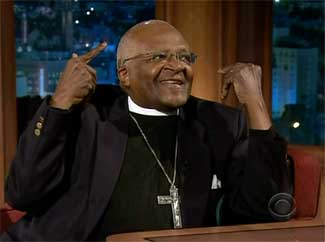
The decision to book Desmond Tutu to counter all the fuss of Jimmy Fallon's opening week as Conan O'Brien's replacement on NBC's Late Night is, in itself, all you need to know about Ferguson. It's not going to get the ratings, not this week -- but it should get lots of attention. In any case, it makes a very strong statement that Ferguson's talk-show sandbox, on occasion, is big enough to accommodate adults.
Ferguson isn't the first late-night host to conduct lengthy, serious conversations with important guests outside of show business. That would have been Steve Allen. Then Jack Paar, whose conversational style Ferguson most emulates. Both of them made room for special shows featuring politicians, poets, physicists , artists and others. And, more recently, Johnny Carson (on occasion, as with Carl Sagan on astronomy), Dick Cavett, Tom Snyder, Bob Costas and David Letterman.
Right now, Letterman's the only other one in late-night, besides Ferguson, who could interview Tutu competently. Letterman's recent interview with the U.S. Airways "Miracle on the Hudson" crew demonstrated that he's still got strong skills when he wants to tackle serious topics, and talk to people outside the normal Hollywood orbit.
But Ferguson did much more than that, something unique and invaluable. From the very start, he let the studio and home audience know that this visit by Tutu was something different, and special. Then he did an off-the-cuff lengthy monologue that amounted to nothing less than an entertaining, understandable, shockingly thorough history of South African politics and colonization.
It's easy to recognize Ferguson as a natural entertainer, but in Wednesday's show, I saw something new: He's a natural teacher as well. What a wonderful lecture, putting the next guest, and the issues they were about to discuss, in perfect perspective. The best lectures don't feel like lectures, but like stories, and Ferguson told his chosen stories beautifully, punctuated by very funny asides and jokes.
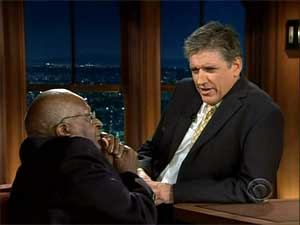
And when Tutu came out, the Archbishop laughed when Ferguson ripped up his note cards, and giggled with glee even before Ferguson asked his first question. "You're crazy," Tutu told him, but with an admiring tone. An Archbishop may not often be greeted with such breezy irreverence -- and it may be just as rare to be talking to someone with such a comfortably conversational command of such topics as religion, politics, history, marriage, faith and forgiveness, all of which Tutu and Ferguson discussed for the rest of the show.
I can think of three times when an interview on a TV talk show has proven inspirational, to me, almost beyond measure. The first was when Bill Moyers interviewed mythologist Joseph Campbell on PBS. The second was when a dying Dennis Potter, author of The Singing Detective, was interviewed on British TV and spoke about treasuring life. (In this country, Letterman's final interview with Warren Zevon, with his advice to savor every sandwich, is a rough analogue.)
Ferguson's talk with Tutu ranks as the third.
"Have you found out how powerful telling one's story can be?" Tutu asked Ferguson at one point.
"A little bit, yeah," Ferguson replied. "I know a little bit about that."
Ferguson could have elaborated, and explained to Tutu that he has come out on his TV show, at certain times, to drop the jokes and speak seriously and honestly: about his past alcoholism, the death of his father and the death of his mother, to name just three unforgettably powerful TV hours. But he didn't. He let Tutu keep going. The show, that night, wasn't about Craig Ferguson -- and knowing that was what made it so fabulous.
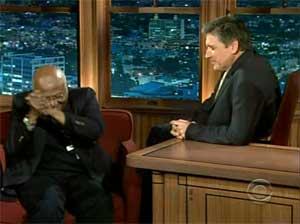
Near the end, Ferguson asked Tutu about his reaction to the election of Barack Obama. Tutu danced in his chair, told a story, then made a remark that Ferguson politely challenged, ending the show on a marvelous discussion about American foreign policy and perception.
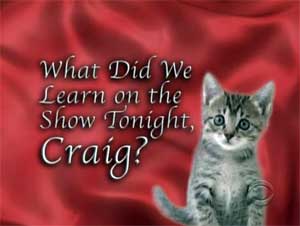
Well, almost ending it. The show actually ended, as usual these days, with "What Did We Learn on the Show Tonight, Craig?," a segment in which the host removes his tie, puts his feet on his desk, and summarizes the preceding hour of TV.
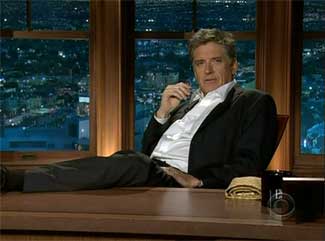
Usually, it's nonsense -- but on this occasion, there was a palpable sense of awe, and maybe even an understandable undercurrent of pride.
"That," Ferguson said of Tutu, "is the single most impressive human being I have ever met."
Everyone interested in the late-night TV wars must seek out an online replay of this hour with Tutu. CBS should replay it in prime time, as a substitution for one of its Saturday night reruns. Or pre-empt The Amazing Race for a week and replay the "Tutu Talk" right after 60 Minutes, where the audience, and the flow-through, would be perfect.
To me, though, Wednesday's show marks the end of the late-night chess match. Thanks to the bishop, Ferguson should be crowned the new king. All the other newcomers and contenders are just late-Knights. Or pawns.